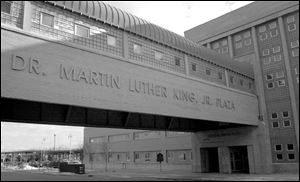
More Toledo honors for King at standstill
10/2/2004
Toledo's train station was named in honor of Martin Luther King Jr., in 2001, as the station's pedestrian walkway indicates.
Three years after a compromise was proposed to end a racially divisive disagreement over a grander way for Toledo to honor the Rev. Martin Luther King, Jr., nothing has happened.
Plans have stalled to raise $1 million to build a black history museum and multicultural center bearing the civil rights leader's name on land next to the train station that already bears his name, said the Rev. Robert Culp, who has been leading the effort.
Some local black leaders have been trying to find a grander way to honor the slain hero beyond naming the train station plaza, a road in front of the plaza, and the former Cherry Street bridge after Mr. King.
"Right now, there's no movement," said Jimmy Gaines, acting city director of public service and a volunteer for the project.
The group hasn't raised any money since a compromise plan was hatched in 2001, and it hasn't attained tax-exempt status, either, Mr. Gaines said. The organizers also would prefer a larger site than the land near the train station, which was renamed the "Dr. Martin Luther King Jr. Plaza" in 2001, he said.
"It's a little smaller area than we would like. . . . We haven't raised any money. We've been working on our tax status," Mr. Gaines said. He did not have a timetable for further activity.
The years-long process of choosing which streets and structures to name has at times been racially charged, especially after the Martin Luther King, Jr., Street Renaming Committee, formed by then-Mayor Carty Finkbeiner in 2001, suggested three options: Toledo Express Airport, Collingwood Boulevard, or Cherry Street.
The Cherry Street and airport ideas found tepid support. Some residents and businesses along Collingwood Boulevard, once the mansion row of Toledo as it ran through what is now the Old West End, opposed renaming that street, which drew some charges of racism.
The process even spawned a racial reconciliation group.
The train station proposal was suggested by Mayor Finkbeiner as a compromise and was made more palatable for some with the added dimension of the museum and multicultural center.
The blond-brick train station plaza is tucked away at 415 Emerald Ave., off Summit Street and Broadway south of the Erie Street Market.
"We simply accepted it. [But] the original enthusiasm was not there for the train station," said Reverend Culp, who was on Mr. Finkbeiner's renaming committee.
The Toledo-Lucas County Port Authority, which owns the plaza, approved the name change and signage was installed. A committee was formed to plan and raise funds for the museum and multicultural center, but that was 2001.
The Rev. Floyd Rose, former president of the Toledo NAACP and founder of Family Baptist Church, said last week he was never satisfied with the train-station compromise.
"I just think it's a shame. Toledo is the only city with a sizable black population that doesn't have a major road named after him. That's a joke," he said yesterday. "I bet you only 20 black folks in Toledo know that train station was named after Dr. King."
In the early 1990s, Mr. Rose led a movement to find a major Toledo artery that could bear the name and celebrate him. With the job undone, the frustrated reverend, who also was an ombudsman for the Toledo Public Schools system, moved to Valdosta, Ga., in 1995.
"To be honest, I just got sick of it," he said last week.
Mr. Rose gave up on the process after several roads, including Dorr Street, which runs by Inverness Club and Dana Corp., were rejected informally by the mayor and City Council, which would have to approve the change.
"Their assumption was that kind of club, [Inverness Club], would not be on a street like that because his name would be associated with a poor neighborhood, meaning black," he said an elected city official told him. "It's crazy to me. You'd think they'd be honored.
"They said the street was named after [seven-term mayor] Charles Dorr and couldn't be changed," Mr. Rose continued. "Black folks weren't even allowed to live on Dorr Street then. We said, 'Why don't you give it to us up to Richards Road?' They said, `No, because it'll look like that's what the white folks wanted.' I said, 'It'll look like it because it's true.'●"
Mayor Dorr served from 1851-1867.
"I think it's a dead issue, and it's a shame for all of us," Mr. Rose said.
Mr. Gaines sees it differently: Naming a train station after Reverend King was a greater accomplishment than a road, he said.
"The train station reaches beyond the limits of the city of Toledo," he said. "Anybody coming in would see the Dr. King name."
The civil rights leader visited Toledo on behalf of the Southern Christian Leadership Conference in 1967 and spoke at Scott High School during his only recorded visit.
According to a Toledo Times article, he talked about the economic state of black Americans, his opposition to the Vietnam War, and the need for additional civil-rights legislation.
He was assassinated six and a half months later in Memphis.
Contact Christopher D. Kirkpatrick
at: ckirkpatrick@theblade.com
or 419-724-6077.